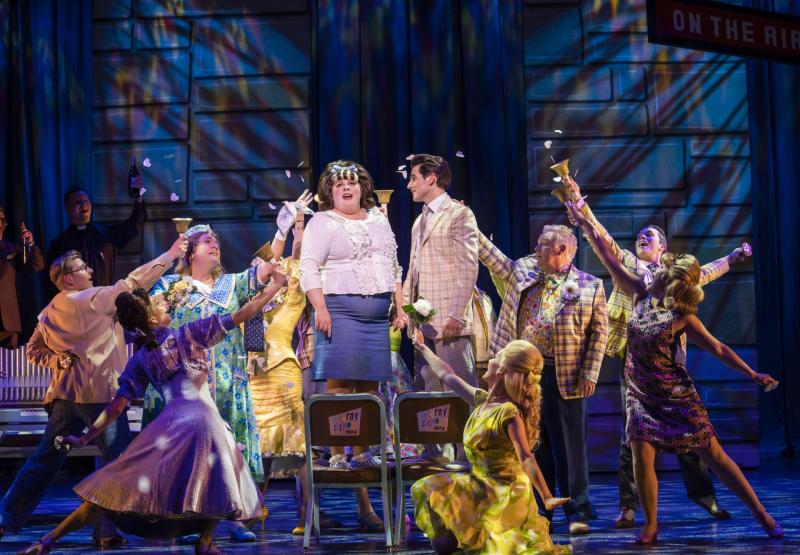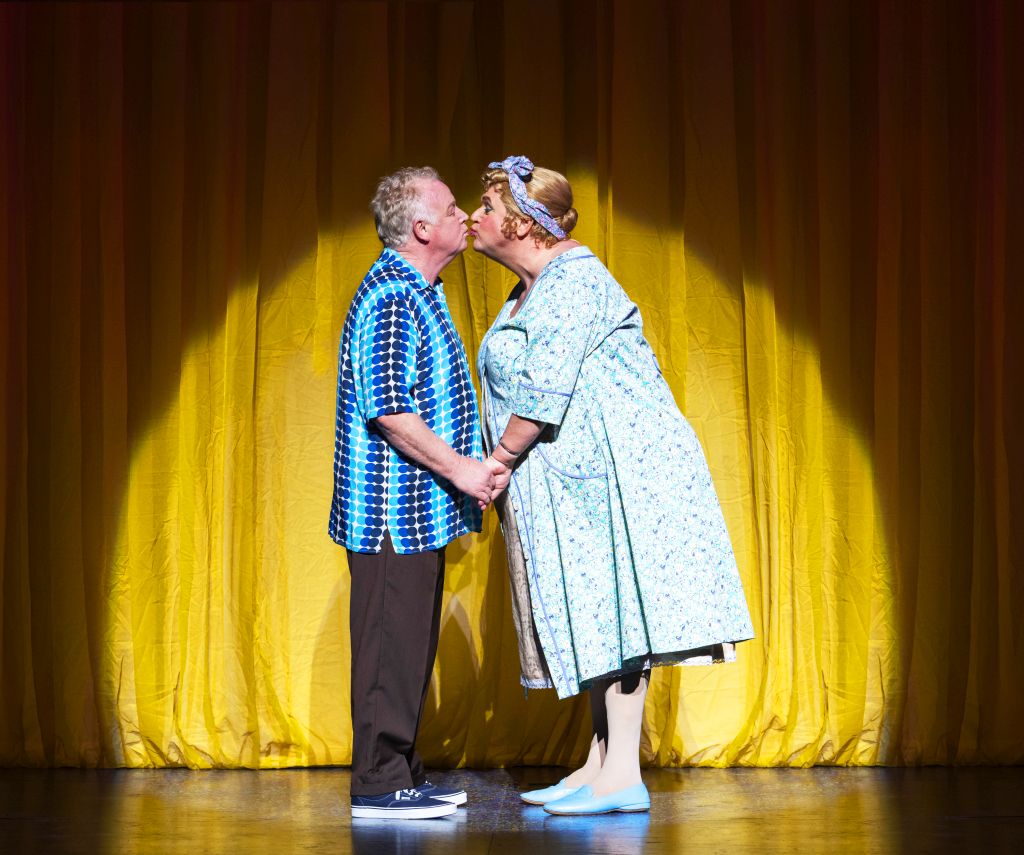Hairspray, London Coliseum review - brighter and more welcome than ever | reviews, news & interviews
Hairspray, London Coliseum review - brighter and more welcome than ever
Hairspray, London Coliseum review - brighter and more welcome than ever
Popular London and Broadway musical soars anew

A revival of a multi-award winning musical, with a big star or two, may look like a safe choice to re-open London’s largest theatre, the Coliseum, but there was a tingle of jeopardy in the air, exemplified when the show catches you by surprise, the curtain rising when (surely) people remain in the bar?
At first with this new reiteration of the Broadway and London hit Hairspray, the costumes and (inevitably, in this show) the wigs appear to do the heavy-lifting; the colours and the spectacle dilate pupils too long focused on small screens, on small people who are far away, not life-sized humans right here, right now. Then the energy careers from stage to stalls, the absurdity of musical theatre’s central conceit - that adults have chosen to tell their story through the medium of song and dance - annulled in an instant by the opening number. We’re at home in a world at once comfortingly familiar and wildly bonkers and it's seducing us with its sledgehammer proposition, “Are you not entertained?” Yes… we sure are.
 It's Baltimore 1962 and Corny Collins has the biggest show on TV, his troupe of teenagers grooving to the latest hits in that wholesome gap between Buddy and The Beatles. Tracy, the biggest girl in school, practises the moves and dreams of joining the show, but she’s not the producer’s idea of a TV star at all. What of it? She has chutzpah to burn and can see a new world emerging on the horizon, one in which the show is integrated and that has no need for the monthly “Negro Day”, a world in which her heartthrob, Link Larkin, is more than just her poster boy.
It's Baltimore 1962 and Corny Collins has the biggest show on TV, his troupe of teenagers grooving to the latest hits in that wholesome gap between Buddy and The Beatles. Tracy, the biggest girl in school, practises the moves and dreams of joining the show, but she’s not the producer’s idea of a TV star at all. What of it? She has chutzpah to burn and can see a new world emerging on the horizon, one in which the show is integrated and that has no need for the monthly “Negro Day”, a world in which her heartthrob, Link Larkin, is more than just her poster boy.
There’s an edge all right. Velma von Tussle and her mean girl daughter, Amber, may be comic book villains, but there’s venom in their espousing of Jim Crow segregation and an immediacy in 2021 that may not have been as potent in the show’s 2008 West End production. Theirs are faces and sentiments that belonged in the past just 13 years ago; now they are very much of our present and the old poison needs excising yet again. That said, this Jack O’Brien-directed show is no polemic - it’s feelgood stuff underpinned but not drowned out by a social conscience and contemporary relevance.
Michael Ball and Les Dennis (pictured above), veteran entertainers these days, lead the charge, Ball reprising his Olivier Award winning turn as Tracy's mum Edna and having a lot of fun with Dennis on their vaudeville duet, “(You’re) Timeless To Me”, the old pros corpsing and kissing and enjoying it at least as much as we are.
There’s super work throughout the cast, Jonny Amies lovable as Link, Rita Simons vicious as Velma and Mari McGinlay and Ashley Samuels delightful as the colour-bar crossing sweethearts, Penny and Seaweed. A frisson of excitement crackles from those in the know when Dreamgirls alumna Marisha Wallace embarks on “I Know Where I’ve Been”. The American powerhouse gives full belting value to Marc Shaiman and Scott Wittman’s epic, emotional explanation of the roots and persistence of racial injustice - a guaranteed foot-stamping showstopper.
For all these splendid performances, the night needs a star in whom we can believe and we get one in Lizzie Bea. She gives us a Tracy Turnblad brimming with charm and wit, artless but bright, vulnerable but determined. She sings well, and can dance (moving much better than Les Dennis - then again, so do I) but it’s that indefinable charisma, reaching out to all corners of the four-tiered house, that lifts us over and over again. The show, very importantly, has its centre.
It was an emotional evening on both sides of the fourth wall, an opening night in more senses than one, with Ball taking the mic at the curtain call to yet more rapturous applause that made up in volume for what it lacked in numbers. The evening also reconnected a cast with an audience - like two bare wires touching, the sparks flew - and made clear, were we in need of a reminder, what we had missed. More importantly for everyone involved in a bloodied but unbowed industry, and as Ball underlined at the curtain call, it showed us what we can have again. Together.
rating
Share this article
The future of Arts Journalism
You can stop theartsdesk.com closing!
We urgently need financing to survive. Our fundraising drive has thus far raised £49,000 but we need to reach £100,000 or we will be forced to close. Please contribute here: https://gofund.me/c3f6033d
And if you can forward this information to anyone who might assist, we’d be grateful.

Subscribe to theartsdesk.com
Thank you for continuing to read our work on theartsdesk.com. For unlimited access to every article in its entirety, including our archive of more than 15,000 pieces, we're asking for £5 per month or £40 per year. We feel it's a very good deal, and hope you do too.
To take a subscription now simply click here.
And if you're looking for that extra gift for a friend or family member, why not treat them to a theartsdesk.com gift subscription?
more Film
 Blu-ray: The Sons of Great Bear
DEFA's first 'Red Western': a revisionist take on colonial expansion
Blu-ray: The Sons of Great Bear
DEFA's first 'Red Western': a revisionist take on colonial expansion
 Spinal Tap II: The End Continues review - comedy rock band fails to revive past glories
Belated satirical sequel runs out of gas
Spinal Tap II: The End Continues review - comedy rock band fails to revive past glories
Belated satirical sequel runs out of gas
 Downton Abbey: The Grand Finale review - an attemptedly elegiac final chapter haunted by its past
Noel Coward is a welcome visitor to the insular world of the hit series
Downton Abbey: The Grand Finale review - an attemptedly elegiac final chapter haunted by its past
Noel Coward is a welcome visitor to the insular world of the hit series
 Islands review - sunshine noir serves an ace
Sam Riley is the holiday resort tennis pro in over his head
Islands review - sunshine noir serves an ace
Sam Riley is the holiday resort tennis pro in over his head
 theartsdesk Q&A: actor Sam Riley on playing a washed-up loner in the thriller 'Islands'
The actor discusses his love of self-destructive characters and the problem with fame
theartsdesk Q&A: actor Sam Riley on playing a washed-up loner in the thriller 'Islands'
The actor discusses his love of self-destructive characters and the problem with fame
 Honey Don’t! review - film noir in the bright sun
A Coen brother with a blood-simple gumshoe caper
Honey Don’t! review - film noir in the bright sun
A Coen brother with a blood-simple gumshoe caper
 The Courageous review - Ophélia Kolb excels as a single mother on the edge
Jasmin Gordon's directorial debut features strong performances but leaves too much unexplained
The Courageous review - Ophélia Kolb excels as a single mother on the edge
Jasmin Gordon's directorial debut features strong performances but leaves too much unexplained
 Blu-ray: The Graduate
Post #MeToo, can Mike Nichols' second feature still lay claim to Classic Film status?
Blu-ray: The Graduate
Post #MeToo, can Mike Nichols' second feature still lay claim to Classic Film status?
 Little Trouble Girls review - masterful debut breathes new life into a girl's sexual awakening
Urska Dukic's study of a confused Catholic teenager is exquisitely realised
Little Trouble Girls review - masterful debut breathes new life into a girl's sexual awakening
Urska Dukic's study of a confused Catholic teenager is exquisitely realised
 Young Mothers review - the Dardennes explore teenage motherhood in compelling drama
Life after birth: five young mothers in Liège struggle to provide for their babies
Young Mothers review - the Dardennes explore teenage motherhood in compelling drama
Life after birth: five young mothers in Liège struggle to provide for their babies
 Blu-ray: Finis Terrae
Bleak but compelling semi-documentary, filmed on location in Brittany
Blu-ray: Finis Terrae
Bleak but compelling semi-documentary, filmed on location in Brittany
 Oslo Stories Trilogy: Sex review - sexual identity slips, hurts and heals
A quietly visionary series concludes with two chimney sweeps' awkward sexual liberation
Oslo Stories Trilogy: Sex review - sexual identity slips, hurts and heals
A quietly visionary series concludes with two chimney sweeps' awkward sexual liberation

Add comment